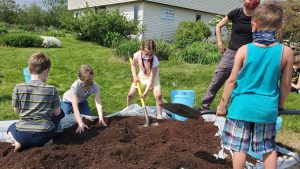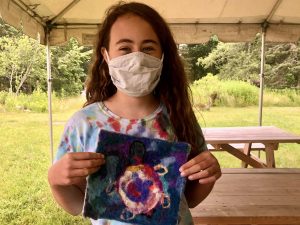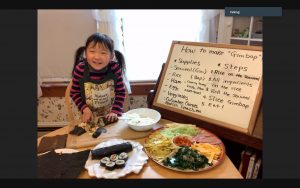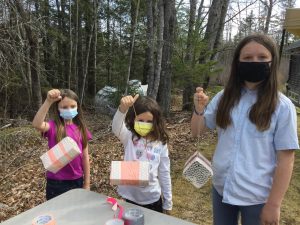University of Maine Cooperative Extension Hancock County – 2020 Annual Report
ANNUAL REPORT
Our Annual Report features highlights of educational programming at the University of Maine Cooperative Extension in Hancock County
June 30, 2020 – July 1, 2021
Office of the Dean

Welcome to the University of Maine Cooperative Extension! We are located across the state in 16 county offices, research farms, 4-H camps and learning centers, and online. We are the largest outreach component of the University of Maine and reach more Maine people than any other entity within the seven campus University of Maine System. Our work is focused on helping Maine communities thrive and we do so by connecting people to research-based information, education and services. UMaine Cooperative Extension conducts the state’s most successful out-of-school youth education program through 4-H, empowering young people to reach their full potential. Extension also helps support, sustain, and grow the food-based economy across the entire state of Maine. In addition, we partner with other organizations and programs to provide additional educational opportunities to a diversity of audiences across this state.
UMaine Cooperative Extension is determined to make a positive difference in our areas of excellence and beyond for the citizens of Maine. Explore our website, visit a county office, and contact our enthusiastic workforce.
— Hannah Carter, Dean
HANCOCK County Extension Association
President – Greg Veilleux – Bar Harbor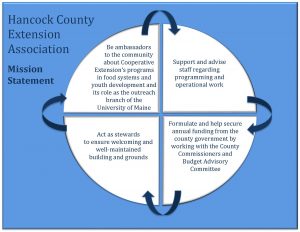
V. President Dotty Caldwell – Penobscot
Treasurer – Mary Jude – Lamoine
Secretary – Jennifer Jones – Southwest Harbor
Members:
Kristin Beauchamp – Dedham
Rachel Emus – Blue Hill
Jane Freeman – Ellsworth
Craig Gladstone – Bar Harbor
Betty Robshaw – Bucksport
Dwight Sargent – Lamoine
Mary Soper – Orland
HANCOCK County Staff
Marjorie Peronto – Extension Educator marjorie.peronto@maine.edu
Suzanne Baez – Administrative Support Supervisor sue.baez@maine.edu
Joyce Fortier – Administrative Specialist joyce.fortier@maine.edu
Zabet NeuCollins – Community Education Specialist / 4-H zabet.neucollins@maine.edu
Carla Scocchi – 4-H Professional carla.scocchi@maine.edu
Debra Spurling – Community Education Specialist / EFNEP debra.spurling@maine.edu
University of Maine Cooperative Extension’s Digital Presence and Pandemic Response
In 2020, University of Maine Extension’s website at extension.umaine.edu – a composite of 58+ interconnected websites – received over 2.8 million pageviews. More than 50,000 followers followed or were subscribed to UMaine Extension’s 58 county and program-specific social media accounts on Facebook, Twitter, YouTube, Pinterest, and Instagram. More than 93,000 web visits were referred from social media. More than 400 educational videos were available to visitors on our YouTube and Kaltura channels or embedded in our web pages. More than 8,350 clients used our online registration system to register for classes, workshops, events, and more. In the wake of COVID-19, UMaine Extension quickly moved its workshops, classes, and events online. Between March 1 and December 31, 2020, unique pageviews on the UMaine Extension website increased nearly 30% over the same period of time the previous year.
- New resources were created and added to the website and social media, including COVID-19 support for Maine farmers, livestock producers, U-pick operations, cut flower and seedlings industries, and consumers.
- Weekly Zoom meetings allowed producers to share what was happening on their farms.
- New “Learn at Home” resources provided educational opportunities for parents, teachers, and youth during school closures.
- Horticulture and food preservation videos, webinars, interactive forms, and virtual office hours provided answers to an increased number of questions from home gardeners.
- A new interactive locations map allowed clients to find Maine farm and seafood products; the map has been viewed 190,000+ times since it became
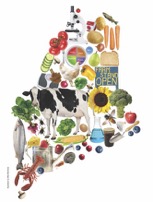 available to the public on March 20, 2020.
available to the public on March 20, 2020. - With the closing of state and county fairs, the first-ever Maine State Virtual Fair was created to recognize 4-H’ers for their efforts on projects they completed and skills they gained over the past year.
- More than 180 online events were promoted through Facebook, which had a reach of 470,000 views and 11,7000 responses.
- Our popular Ask the Expert online form received 346 questions from Maine home gardeners between March 1 and December 31, 2020, nearly twice the number during the same period in 2019.
- 42 new publications were published specifically in response to the pandemic. These included: Finding New Markets for Maine Farmers, Managing Garden Centers and On-Farm Seedlings Sales Safely in Maine, Best Practices for Washing Produce, Use of Sanitizers on Commercial Farms, Tips for Starting a Healthy Garden, and Maine Maple Tours: Guidance During COVID-19. Extension typically publishes 22 new publications in a 12-month period.
COUNTY HIGHLIGHTS—
Maine Food System
SUPPORT FOR MAINE GARDENERS DURING THE COVID-19 PANDEMIC
With the Covid-19 pandemic came a dramatic surge in interest in home food production. To provide support for beginning gardeners, UMaine Extension’s Home Horticulture team developed new programs and offered traditional programs in new ways. The following new learning opportunities were offered to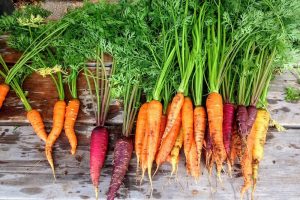 Hancock County residents.
Hancock County residents.
Victory Gardens for ME Video Series
Extension Educator Marjorie Peronto worked with four UMaine Extension colleagues to produce a series of ten instructional videos for Mainers growing their first vegetable garden. These online programs, released once a week during the 2020 growing season, were viewed by over 10,000 people!
Grow with Good Morning Maine: WVII Channel 7 News
Throughout the 2020 growing season, Extension Educator Marjorie Peronto
conducted fourteen weekly television segments on growing your own food, reaching approximately 5,000 viewers per segment.
Live Gardening Webinars offered year-round
While our constituents were hunkered down at home, Extension horticulture staff offered twenty-four biweekly webinars to help people develop skills in areas such as four-season gardening, growing a backyard orchard, root cellaring, building pollinator habitat, gardening in a shifting climate, and so much more. 261 Hancock County residents participated in these programs, accompanied by enrollees from 29 other states and eight different countries!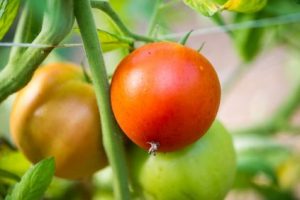
Garden Mentorship Program
This new program matched experienced Master Gardener Volunteers with first-time gardeners, providing virtual technical assistance and encouragement throughout the growing season.
Workforce Training Program: Sustainable Landscaping and Garden Management
In the spring of 2021, Extension Educator Marjorie Peronto collaborated with the Native Gardens of Blue Hill and Kennebec Valley Community College to develop and offer a nine-part online training designed to prepare students to work as professional landscapers and gardeners using organic and environmentally sensitive practices. 20 students from Hancock and neighboring counties completed the course. A second course is being offered in the fall of 2021.
Technical Assistance and Soil Tests for Hancock County Residents
Extension staff fielded 573 inquiries from Hancock County residents regarding pest management, soil test interpretation, home food production, ornamental gardening, composting and pesticide safety. Throughout the pandemic, UMaine Extension’s labs continue to diagnose plant diseases, insects, ticks, and veterinary issues. In addition, 700 soil tests were performed for Hancock County growers.
Support for Hancock County Master Gardener Volunteers
The 2021 Maine Master Gardener Volunteers training was completely revamped, expanded, and offered statewide via ZOOM, reaching a larger and more diverse group of participants because of its accessible online format. Twenty-four Hancock County residents are currently taking this two-semester course in horticulture and volunteerism. During the summer, trainees are conducting volunteer projects such as growing and gleaning food for hunger relief, youth gardening initiatives, and creating public native landscape plantings.
In 2020, despite pandemic restrictions, 38 dedicated Hancock County Master Gardeners strengthened our communities through their volunteer efforts. Collectively, Hancock County MGVs contributed
1,385 hours of labor valued at $39,528 in 2020. (calculated using $28.54 per hour, source: independentsector.org). Master Gardener Volunteer community projects are located in the towns of Bar Harbor, Blue Hill, Brooklin, Eastbrook, Ellsworth, Hancock, Mount Desert, Northeast Harbor, Seal Cove, and Southwest Harbor.
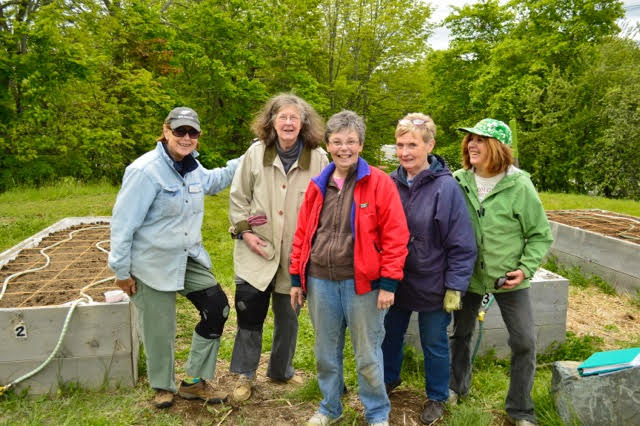
COVID-19 INFORMATION AND SUPPORT FOR MAINE FARMERS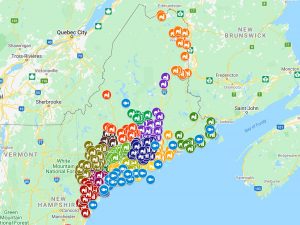
UMaine Extension staff teamed with numerous partnering agencies to create extensive online resources to support farmers during COVID-19. Examples include: Online Maine Farm and Seafood Products Directory Cooperative Extension created an interactive map and database of Maine farms for consumers to connect directly with producers and learn about their products, pick-up options, and safety procedures during the COVID-19 outbreak. Twenty-three Hancock County Farms have benefited by being listed in this directory.
Online Seminars for Wild Blueberry Growers
Hancock County lowbush blueberry growers participated in Cooperative Extension’s free webinar series which highlighted University blueberry research updates and offered workshops on production, processing and marketing lowbush blueberries. Pesticide applicator licensing credits were available. All sessions were recorded and are posted on our Maine Wild Blueberry program website.
COVID-19 Guidance for Wild Blueberry Harvest
50 Hancock county Wild Maine Blueberry growers received newsletters and participated in on-line workshops and information sessions in 2020. Extension’s Wild Blueberry Specialist Dr. Lily Calderwood compiled guidelines for keeping blueberry harvest workers safe during the pandemic.
Best Management Practices and Support for U-Pick Farms During COVID-19
Cooperative Extension developed safety guidelines and resources for Pick-Your-Own Operations and consumers.
Food Safety Standard Operating Procedures for Farms During COVID-19
Extension’s website provided recommended procedures for farm and food safety, guidelines for agricultural employers and workers, sources of PPE and farm disinfecting supplies.
Farm Financing, Employment and Legal Issues During COVID-19
Extension provided updates and web links to grants, loans, food and disaster assistance programs, and legal information for farms.
Food Security Initiatives
Hancock County Volunteers Grow and Glean Food for our Neighbors in Need
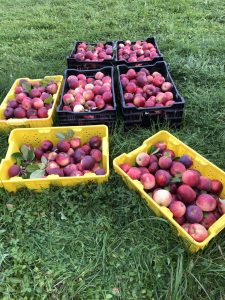
Even during the pandemic, our Master Gardener Volunteers worked tirelessly to grow fresh produce for hunger relief. Nearly six tons of fruits and vegetables were grown, gleaned and distributed to 21 Hancock County food pantries, community meal sites, homeless shelters, school backpack programs and subsidized housing facilities. In 2020, for our tenth consecutive year, we gleaned and redistributed surplus apples from Johnston’s Apple Orchard in Ellsworth, thanks to the generosity of Brett and Doris Johnston.
Hancock County Food Security Network
Cooperative Extension and Healthy Acadia bring together representatives from food security organizations throughout Hancock County to work on common issues faced by emergency food suppliers, organize advocacy efforts, share resources and receive professional training. The Hancock County Food Security network orchestrated our tenth annual Countywide Food Drive during the month of March, 2021. Despite having to conduct the event during the coronavirus pandemic, the team raised $36,000 for hunger relief in Hancock County, which was divided among eighteen food pantries, community meal sites and school backpack programs.
Free Vegetable Seed Distribution to Families Experiencing Food Insecurity
Cooperative Extension coordinated the distribution of over 1,000 vegetable seed packets (donated by Salisbury Organic Garden Center) to Hancock County families facing food insecurity, via food pantries, community meal sites, and social service agencies.
Selected Partnerships and Collaborations for local food systems and horticulture
- Bucksport Community Concerns
- Charlotte Rhoades Park
- Downeast Family YMCA Camp Discovery
- Friends in Action
- Healthy Acadia
- Healthy Peninsula
- Loaves and Fishes Food Pantry
- Johnston’s Apple Orchards
- Native Gardens of Blue Hill
- Sweet Haven
- What’s for Suppa Food Pantry
COUNTY HIGHLIGHTS —
4-H POSITIVE Youth Development
4-H is the positive youth development program of the University of Maine Cooperative Extension. Hancock County 4-H is focused on educating and empowering youth through hands-on and community-based experiences, with self-directed learning and collaborations. 4-H youth acquire knowledge and skills that will contribute to leadership and the ability to succeed now and in the future. The four “H’s” stand for Head, Heart, Hands, Health, and represent the foundation for positive youth development found in all 4-H programs. The 4-H model for Positive Youth Development is successful because of its focus on positive and sustained relationships between youth and adults, activities that build important life skills, and opportunities for youth to use these skills as participants and leaders in valued community activities.
![]()
Selected Program Highlights
Connecting kids and families across Hancock County
4-H June Jamboree: A mix of take-home and in-person hands on activities across Hancock County to celebrate the return of summer and in-person programming. 4-H Jamboree took place from June-July 2021 with over 30 participants
- Tomato in a Bucket, Ellsworth June 2021
- Paint with Felt, ArtWaves on MDI 2021
Addressing Summer Learning Loss
4-H Summer Learning Series – a virtual experiential learning for youth ages 5-18 with over 50 online and offline workshops to choose from. Topics range from engineering, art, science, animals & agriculture, food & nutrition, teen leadership, and more. This program is powered by 4-H staff and volunteers. Delivered in Summer 2020 and 2021 to over 200 youth; 84% of youth reported feeling connected to others, 94% were able to explore something they really cared about, and 100% felt welcome in the program.
Collaborating for Local Impact
Peninsula Explorers 4-H Club: This outdoor education 4-H Club is delivered in partnership with the Blue Hill Heritage Trust. The focus of the club is to provide area youth with fun, educational and safe experiences in a variety of outdoor activities. The club theme in Spring 2021 was “Native Bees”, and past themes have included: orienteering, ice fishing, outdoor cooking, local fisheries, and more!
4-H Public Speaking Program: UMaine Cooperative Extension 4-H has a robust Public Speaking Program for youth ages 5–18. UMaine Extension 4-H alumni, who participated in 4-H Public Speaking when they were younger, come back to tell us that this was the most important life skill they learned in 4-H. In 2020 and 2021, the Maine 4-H State Public Speaking Tournaments were held virtually with great success!
Watch the 2021 Awards Ceremony video for a compilation of the amazing youth public speakers and their presentations!
- Grace H. giving her 4-H Public Speaking Demonstration, “How to make Gimbap”, virtually to an audience of her peers and three judges. April 2021.
- Youth in the Peninsula Explorers 4-H Club constructing “Bee Hotels” for solitary native bees in Blue Hill Heritage Trust, May 2021
- Hancock County 4-Hers Alexis and Robert M. participating in the 4-H Summer Learning Series workshop: “MyGarden to MyPlate”, June 2021
Science, Technology, Engineering, and Math (STEM) Opportunities for Youth
4-H Aquaponics Project: The 4-H At-Home Aquaponics Project is an experiential learning program, delivered virtually to 20 youth ages 7-16 in 2020 and 2021. The program includes project-based learning experiences in introductory aquaponic systems and design, fish husbandry, aquaponic gardening, project management, and more. Youth are responsible for designing, building, and maintaining their own aquaponics systems independently at
home with guidance from aquaculture experts, youth development professionals, and their fellow youth peers during regular group meetings. Thanks to the generosity of the Maine 4-H Foundation, the program participants receive start-up funding to support their at-home systems. The program is a collaborative effort between Hancock County 4-H, the Center for Cooperative Aquaculture Research, and the Aquaculture Research Institute. Youth participants have gained many experiences and skills that are sought after by the aquaculture industry, one of the fastest growing industries in Maine (Maine Aquaculture Workforce Development Strategy, 2020). Additionally, most households reported it was the focal point of their summer and that the shared goals not only brought them closer as a family, but provided much needed social-emotional support and peer connection for youth during a challenging time.
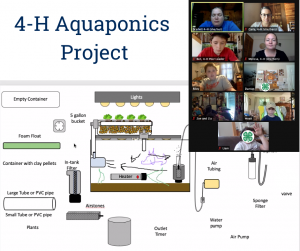
June 2021
*This program received the Denise Miller National 4-H Innovator Award in 2021 and will be recognized on a national level in November 2021*
Workforce Development and Entrepreneurship
Hancock County 4-H Egg Business Project provides learning experiences in business, entrepreneurship, record keeping, documentation, problem-solving, food safety, and animal husbandry. Participants learn about, understand, and follow state and local regulations for Workforce Development and Entrepreneurship Hancock County 4-H Egg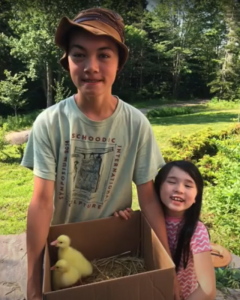 Business Project provides learning experiences in business, entrepreneurship, record keeping, documentation, problem-solving, food safety, and animal husbandry. Participants learn about, understand, and follow state and local regulations for producing and selling poultry eggs. Watch the project video to meet two 4-H’ers who participated in the project as 4-H Peer Leaders in 2020.
Business Project provides learning experiences in business, entrepreneurship, record keeping, documentation, problem-solving, food safety, and animal husbandry. Participants learn about, understand, and follow state and local regulations for producing and selling poultry eggs. Watch the project video to meet two 4-H’ers who participated in the project as 4-H Peer Leaders in 2020.
4-H Egg Business Project Member, Ren S. (pictured here with his little sister), operates Fieldstone Farm where he sells his eggs directly to customers as well as at the Winter Harbor Farmers Market. Ren was mentored by 4-H Volunteer and SBDC Business Advisor, Shannon Byers, in Summer 2020.
Agriculture/Food Security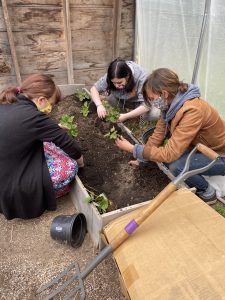
Sumner Memorial High School Greenhouse Project: 4-H Community Education Assistant, Zabet NeuCollins, taught students in the Pathways program at Sumner Memorial High School in Sullivan. Students utilized their school greenhouse to learn about the basics of gardening, which included the importance of climate and microclimates, how to sow microgreens, strawberries, and lettuce, and how to mulch with leaves and seaweed, among other topics.
Right – Students in the Pathways Program at Sumner Memorial High School learning about gardening in Fall 2020 led by Hancock County 4-H staff.
Supporting Local Schools and Teachers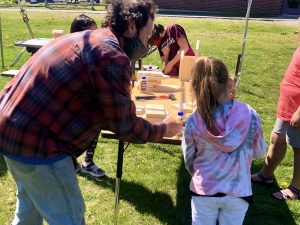
4-H Birdhouse workshop: Second graders at Trenton Elementary School learned how to build a birdhouse through a school-based 4-H project. The students used real tools, such as hammers and clamps, to create their birdhouses. The lesson complemented their spring curriculum, as the students were learning about birds and were counting birds for a community science project.
Right – The 4-H Birdhouse workshop was led by 4-H staff, Zabet, and 4-H Volunteer, Aaron, who is a finish-carpenter from Steuben.
Selected Partnerships & Collaborations
- Ellsworth Public Library, Ellsworth
- UMaine Center for Cooperative Aquaculture Research, Franklin
- Lone Spruce Farm, Dedham
- SBDC at CEI, Inc., Ellsworth
- Blue Hill Heritage Trust, Blue Hill
- Art Waves MDI, Bar Harbor
- Trenton Elementary School, Trenton
- Bucksport High School, Bucksport
Parent testimonials
“Thank you for creating safe places for 4-H in Hancock County with your training of volunteers and leaders. I have never seen leaders quite like this.”
“Thank you again, for having a safe place for kids to be brave and attempt things outside their comfort zones.”
“The training [4-H] volunteers receive is top notch, and it does have a ripple effect in a world that can be very challenging to navigate. [My son] is only 1 story, and these are only a few parts, so I can only imagine all of the untold parts that are tucked away in Moms and Dads hearts that have happened in the 4-H Hancock County community. I have seen, heard, and felt being included. And more importantly, our son, who has been told in school and other groups, “You’re too this….”you’re too that….”, it has been refreshing to have him wanted, not just tolerated. These are the connections that matter.”
“They were able to easily feel like they belonged, felt welcomed, and when children feel this way they are open to learning and trying new things”
“She has learned so many life skills from being in 4-H and built so many wonderful lifelong friendships”
“The organization of [4-H] materials and delivery of learning is always top notch”
COVID-19 Program Testimonials:
“While COVID-19 certainly has thrown a wrench into pretty much every aspect of life, I think the participants [in this 4-H program] really benefited from this change”
“We are grateful! We loved the in-person events and although we couldn’t come together, you still connected families who wanted to participate.”
“[My child] would have spent more time on the TV had they not participated in this program”
“If it wasn’t for this program, [my children] would not have worked as a team and would have spent more time in their rooms”
“The effort, skill, and perseverance that went into putting this [program] all together is not only amazing, but shows so clearly just how dedicated 4-H is to our youth!
STATEWIDE HIGHLIGHTS—
Maine Food System
Maine Potato IPM Return on Investment of More Than 100 to 1
Relevance — The $500 million potato industry is the largest agricultural sector in Maine, encompassing more than 500 businesses generating more than $300 million in annual sales, employing over 2,600 people, and providing over $112 million in income to Maine citizens. The management of insects, diseases, weeds, and other pests is integral in sustaining a healthy Maine potato crop. Potato growers are increasingly relying on a multidisciplinary Integrated Pest Management (IPM) approach to ensure that Maine’s potato crop is pest- and damage-free while attempting to minimize the amount of pesticides applied.
Response — Extension’s Potato IPM Program impacts Maine’s 300 commercial potato growers and 48,000 acres of potatoes and has become an integral part of the Maine potato industry. The program also broadly impacts national and international growers who rely on the state’s seed crop. The project maintains nearly 100 specialized insect traps, coordinates a statewide network of electronic weather stations, and surveys 75 potato fields on a weekly basis for weeds, insects, and diseases. IPM scientists with the help of trained field scouts track potential pest outbreaks to provide growers with current information on treatments to minimize the number of pesticide applications and maximize potato yield. In 2020, we conducted a potato IPM program using six student potato field monitors.
Results — By monitoring the potato sites for insect pests (aphids, Colorado potato beetle, potato leafhopper, European corn borer, etc.) and reporting weekly to all growers, we estimated an approximate savings of $10 million in losses avoided, yield increases, and reduced pesticide use. For an expenditure of $95,000, the return was 110 to 1.
Adding Value to Maine Wild Blueberries
Relevance — Maine’s wild blueberry industry, with 480 growers on 44,000 acres, annually produces as many as 100 million pounds of blueberries and has a direct and indirect economic impact of more than $250 million to the state’s economy. UMaine Extension specialists and researchers provide research-based knowledge to blueberry growers through field and lab work directly with growers, graduate students, other researchers in the U.S. and Canada, and the Wild Blueberry Commission of Maine. Unfortunately, since 2014 the price per pound that farmers receive for their berries has dropped below the cost of production. Farmers now receive an average of $0.35/pound for their berries to go to the conventional frozen market and it costs $0.52 cents to produce each pound of berries using the recommended range of pest and crop management tools. Value-added markets are needed to diversify the channels in which wild blueberries are sold.
Response — In 2018, Extension began working with Bluet Winery located in Maine, which makes a dry, sparkling wild blueberry wine and was looking for a source of blueberries. Extension introduced Bluet to growers interested in selling their berries to a winery and advocated for the farmers by explaining the costs of production. Since then, Extension has shared our knowledge of the crop with Bluet, facilitated collaborations between Bluet and UMaine food science faculty, and successfully secured funding from the USDA CARE program to study the wild blueberry ripening process and field-to-field flavor variation with Bluet.
Results — Growers who sell berries to Bluet make $0.60-$1.00 per pound. Bluet’s use of Maine blueberries has grown from producing 50 cases of wine in 2014 for distribution in Maine to 4,000 cases in 2020 for national distribution. They use an average of 176 pounds of wild blueberries per case of wine. In 2020, Bluet purchased 100,000 pounds of Maine wild blueberries from 5 farms and 1 processor. The company connects their product to the farmers who grew the crop and the land that nurtures this native berry.
Tree Fruit IPM Increases Crop Value and Decreases Pesticide Costs
Relevance — Pest and weather damage are primary causes of significant damage to tree fruit crops, and tree fruit growers rely on UMaine Extension monitoring and management guidance to avoid or reduce pest and weather damage to crop quantity and quality.
Response — The Extension Tree Fruit IPM Program provides growers with regular newsletters, statewide field reports, and research updates, plus weekly on-farm scouting visits, situational analysis, weather data resources, individual consultations, meetings, and webinars.
Results — In 2020, a survey that reached the majority of commercial Maine tree fruit growers and production found:
- 100% of growers benefited from the weather resources and decision support reports provided by Extension.
- 67% of growers benefited from the Extension orchard scouting program, and 96% of those growers reported benefitting from either an IPM presentation, in-person field visit, or telephone or email consultation.
- Growers estimate that crop value, either yield or quality, would have been 31% lower without the Extension Tree Fruit IPM Program. Extrapolating from the most recent USDA statistics for apple crop value in Maine, the value of crop losses prevented by the IPM program services is more than $5.1 million per year.
- In addition to higher production value, Maine growers reported pesticide savings of $436 per acre. Across the 2,688 acres of orchard in Maine, estimated pesticide savings in purchase costs was over $1.17 million.
Supporting Home Horticulture
Relevance — Every day, Maine gardeners are deciding on whether and how to manage pests, what fertilizers to use and how much, what plants to grow, methods to cultivate the soil, and how to utilize water resources to maintain landscapes. Nearly every residential site has a landscape that requires maintenance and decisions made in these sites can have a significant impact on our natural resources. Home gardener success also results in improved food security and has an economic role in our green industry.
Response — In 2020, UMaine Extension home horticulture programs directly reached more than 10,900 adults and 50 youth through over 130 hours of in-person and virtual education programs. Program staff answered more than 6,000 questions received via email, phone calls, and walk-ins, and reached 19,100 people indirectly through videos, newsletters, television segments, and publications.
Results — As a result of Extension programs, participants reported developing new or expanding existing gardens; increased their consumption of home-grown food; adopted sustainable gardening practices involving soil quality, improving efficiency, and adopting IPM strategies; and using Extension to identify pest problems and to determine research-based management strategies.
Maine AgrAbility Boots-2-Bushels
Relevance — Research indicates that our veterans interested in farming as a career and farmers with disabilities are most challenged by skills related to crop and production knowledge, financial skills, time management, aging, and declining strength.
Response — UMaine Extension created Boots-2-Bushels (B2B), a 9-month market gardening education and training program for military veterans and their family members. B2B strives to overcome some of the barriers military veterans face when transitioning to farming, such as lack of agricultural knowledge and business experience. B2B helps veterans use the skills and abilities honed in the military, such as teamwork, perseverance, resilience, initiative, and creativity, in a supportive environment with like-minded peers. B2B uses the “Five Fs” framework (Farming, Family, Finances, Future, Fitness) to address production, marketing, financial, and human sources of agricultural risk, and creates a near-peer cohort that fosters unit cohesion in an empathetic, therapeutic environment.
Results — Sponsored by Extension’s Maine AgrAbility program and in partnership with the Maine Organic Farmer & Gardener Association (MOFGA), B2B takes participants from seed-to-salary in a hands-on and realistic project. Extension and MOFGA educators provide participants with 10 weeks of classroom instruction that includes cultural practices of growing fruits and vegetables for market, and business skills required to sustain a farm business. Once trained, participants put their new knowledge into an intensive 6-month growing season to provide food for their families, other veterans, and community members. Said one B2B participant, “Farming is a form of security to support myself and my community. No matter what happens, farming is a cornerstone for any community to grow around.” At the end of 2020 the program had 23 participants, representing 17 veteran farms, and has an international dimension with one couple from Japan (soon to move to Maine), and a veteran joining from Italy.
Victory Gardens for ME
Relevance — In 2020, the pandemic created a significant increase in demand for home food production information, particularly from beginning gardeners, and simultaneously put a stop to UMaine Extension’s ability to provide in person programming to support that interest.
Response — In response, Extension created a 10-part video series for Mainers growing their first vegetable garden, with episodes including Vegetable Gardening, Planning Your Garden, Preparing Your Garden Soil, Get Planting, Managing Weeds, How to Water Your Garden, What’s Wrong With My Plant?, What to Do With Your Harvest, Pain-Free Gardening, and Preparing Your Garden for Winter. Extension also created a series of thrice-a-week online “Garden Chats.”
Results — The Victory Garden series has had more than 5,000 views, and over the 10 weeks they ran the Garden Chats had 1,155 participants.
Maine Farm and Seafood Products Directory Helps Consumers Find Vendors
Relevance — The onset of the COVID-19 pandemic created widespread fear about what would happen to the markets and businesses of Maine-based farmers. The nearly overnight shutting of restaurants and institutional markets (such as colleges and industrial campuses) and temporary closing of farmer’s markets appeared to directly shut off farmers from the majority of their markets. This impacted farms and food-based businesses of all types and scales, including vegetable, meat, dairy, cut flower, seafood, and bakeries.
Response — In March 2020, an innovative farmer reached out to UMaine Extension for support in promoting a simple spreadsheet that she’d created for seven neighboring farms including their contact information, products available, immediate needs on the farm, and COVID-19 protocols that they had incorporated into their marketing strategies. Extension used our statewide networks and staff to expand on this idea, developing a process for farmers throughout the state to join the list, creating a website to promote the effort, and creating a public-facing map and spreadsheet for viewing the farm information. The farm community saw the value of this marketing tool for connecting with direct-to-consumer sales and quickly signed up.
Results — Within a month there were 405 farm and seafood vendors listed and more than 100,000 views to the page, and there are now nearly 500. While the community demand for local food and direct-to-consumer sales have significantly increased as a result of the pandemic, farmers have attributed much of their new customer base this year to the popularity of this list. The directory has also assisted farms in finding complementary partner farm business with which to build collaborative marketing systems. This transition of markets also includes farms that were primarily wholesale farms transitioning to marketing through established direct-to-consumer farms.
Food Safety Extension Educators Develop and Offer First-Ever Virtual Seafood HAACP Training
Relevance — The 2011 Food Safety Modernization Act (FSMA) was a significant change to food safety regulations in the U.S., introducing a proactive rather than reactive approach to outbreaks. Two major rules impacted farmers and food businesses in Maine and throughout the U.S. They are the Produce Safety Rule and the Preventive Controls for Human Food Rule. The overall goal of these rules is to make America’s food system safer. For produce farmers, the impact of the changes is great because this industry has not been regulated so thoroughly before. Many farmers remain uncertain of how the regulations affect their work.
Response — In 2020, the pandemic created an increased demand for training and need to innovate to offer cutting-edge educational programs. UMaine Extension collaborated with Cornell University/New York Sea Grant to develop national and international guidelines for offering virtual seafood Hazard Analysis Critical Control Points (HACCP) training available through the national Seafood HACCP Alliance and Association of Food and Drug Officials (AFDO).
Results — Since being granted approval by these certifying bodies in April 2020, Extension led and delivered the first-ever virtual Seafood HACCP training in the world and taught in seven additional training sessions, reaching 117 participants. We also facilitated a new FSMA Preventive Controls virtual training.
Maine Food and Agriculture Center Supports State’s Growing Industries
Relevance — The MFAC is a partnership of Extension and the Maine Agricultural and Forestry Experiment Station.
Response — The center utilizes the 16-county reach of Extension, and many of Extension’s recommendations to the state’s agricultural community come directly from research conducted at Experiment Station farms. This research-extension partnership has been working for over 100 years and is as vital today as it was early in the 20th century.
Results — With $5 billion in overall economic impact, agriculture, commercial fishing, and food processing include Maine’s largest, fastest growing, and most promising industries. MFAC is growing to encompass all sectors of the burgeoning food economy, establish first-contact access to the programs and expertise available at all seven of Maine’s public universities, and create opportunities for cross-campus and cross-discipline coordination and program development based on emerging needs in Maine’s food economy.
Veterinary Diagnostic Lab Combines Service, Research and Education
to improve Maine Food System and Quality of Life
Relevance — Maine veterinarians, livestock producers, and animal owners need research-based support and diagnostic services, including necropsy, microbiology, virology, pathology, and special research support. Agricultural and aquacultural producers using Cooperative Extension resources need assistance in finding solutions to a variety of needs. And UMaine students in Animal and Veterinary Science, need hands-on experience in preparation for veterinary and research careers.
Response — UMaine operates the Veterinary Diagnostic Laboratory (VDL) as a service to the veterinarians, livestock producers, and animal owners of the state. During 2020, the UMaine VDL remained open to provide veterinary diagnostic information to farmers and collaborate with UMaine academic researchers. Through Cooperative Extension, the UMaine VDL links with industry to help in the control of animal health-related problems in Maine.
Results — In 2020, UMaine VDL staff processed than 3,500 samples and helped inform more than 160 clients about their animals’ health. We allowed egg producers in Maine to keep marketing their product by providing FDA-required screening for Salmonella enteritidis (SE) on midsize to large egg farms. We helped dairies find out whether their cows were affected by mastitis, and if so, what “bugs” were responsible. We helped horse, sheep, goat, and cattle owners check to see if their animals need worming, and if so, with what kind of product; we also helped them find out if their chosen product actually worked in their animals. We helped the state animal welfare vets discover whether animals had died due to neglect or cruelty by providing fact-based forensic information gathered via necropsies.
Our lab assists UMaine academic researchers by helping with sample preparation for histologic studies, by collaborating on studies where pathology assistance is needed (including a patent for a biomedical device), and by providing microbiological testing in a new study of multidrug resistant Staphylococcus aureus (MRSA). We are collaborating with other animal science faculty and with the Maine Department of Inland Fisheries and Wildlife on studies of moose health and are investigating methods for reducing the risk of meningeal worm (Parelaphostrongylus tenuis) transmission from white-tailed deer to domestic ruminants.
Our lab hires a small number of student workers of diverse backgrounds, who benefit the lab by providing energetic, curious, and detail-oriented efforts. These students help us adapt our methods to develop better teaching and outreach materials for farmers, at the same time as they develop skills and knowledge that will help them in their veterinary careers. Our lab combines service, research, and education to improve agriculture, the food system, and the quality of life in Maine.
Diagnostic and Research Laboratory Brings Many Scientists and Specialties Together Under One Roof
The University of Maine Cooperative Extension Diagnostic and Research Laboratory occupies a 28,000-square-foot commercial laboratory building located a few miles from campus, and houses our Veterinary Diagnostic Lab, Aquatic Animal Health Lab, Arthropod Lab, and Plant Disease Diagnostic Laboratory. This facility is the most bio-secure location within the UMaine System. Opened in 2018, the lab brings together scientists researching animals, agriculture, insects, and plants under one roof. The unique combination of researchers provides many teaching opportunities for students, as well as premier research and outreach facilities. By allowing for research contributions to agriculture, public health, communities, and wildlife, the lab benefits Maine in a variety of ways, including protecting the natural resource- and food-based economies, adding to food safety and human health, and providing unique diagnostic and testing services to farmers, homeowners and the public.
STATEWIDE HIGHLIGHTS —
4-H POSITIVE Youth Development
4-H Ambassadors Spark Student Interest in STEM Careers
Relevance – Developing Maine youth’s STEM literacy is vital to ensuring that our state continues to thrive economically and socially. Given the remote and diverse communities where Maine youth live, informal education can help minimize inequities in rural youth STEM education and career pipelines. Future career opportunities in Maine will depend heavily on STEM skills, whether in the growing fields of healthcare and engineering, or in positions requiring technical skills, such as construction, and maintenance of transportation and energy systems.
Response – Since 2014, Extension’s 4-H STEM Ambassadors program has reached more than 5,600 Maine youth in classrooms, libraries, and afterschool clubs across the state. More than 500 college students of the University of Maine system have been trained and facilitated in-person, hands-on learning experiences fostering youth STEM enjoyment, literacy, and identity. In 2020, in response to the pandemic, we shifted to an entirely virtual program, including training, facilitation, and support for the health and well-being of all participants. Maine 4-H Foundation support allowed materials to be purchased for every youth participant.
Results – The shift to a virtual program allowed for multicampus student teams and increased access for more distant community partners regardless of local program model (remote, in-person, hybrid). In 2020, the 4-H Stem Ambassadors program reached more than 200 students, grades 3-8, across 11 sites with the help of 34 volunteer Ambassadors and 4-H staff facilitators. Through this program, youth ages 8-14 come to view these Ambassadors as mentors and leaders in their community while also developing skills in STEM through hands-on activities. The Ambassadors gained self-esteem and experience presenting publicly.
QuaranTEEN Science Cafés Introduce Youth to Faculty Research
Relevance – As the number of jobs in Maine requiring post-secondary education or training continues to increase, providing opportunities for youth to explore and develop college and career aspirations is paramount to supporting the state’s businesses and economy. Unfortunately, the number of Maine high school graduates enrolled in higher education lags at 40th in the nation. Although research recommends beginning to address college and career aspirations in elementary and middle grades, coordinating access to a college campus presents barriers for rural Maine communities.
Response – Maine 4-H staff connect youth to the STEM (Science, Technology, Engineering, and Math) resources of the University of Maine. We make these connections by bringing youth to campus, or engaging youth with students, faculty, and staff at their school/afterschool/club sites. In 2020, 4-H Virtual “QuaranTEEN” Science Cafés were developed as a way for youth to engage with UMaine scientists and engineers in an informal setting. The format included time for the guest scientist to introduce themselves, show some of their work, and also share a bit about their pathway to UMaine. There was also time for informal questions from teen participants.
Results – More than 140 youth from Maine and 10 other states participated over the initial 11-week session. While the pandemic prohibited us from bringing youth to campus, this virtual program proved to be an accessible way for many youth to be introduced to UMaine and its programs, and resulted in a high level of student engagement. The program’s success prompted Extension to host a second Science Café series in the fall.
4-H Summer Learning Series Provides Peer Connections and Teaching Mentorship, and Science and Leadership Development
Relevance – As a result of the pandemic Maine schools and community sites shut down and summer camps and traditional in-person summer programs were cancelled. Youth and educators were left struggling to find a way to connect with each other while remaining physically apart. Maine youth were feeling isolated, alone, and without a sense of purpose.
Response – UMaine Extension responded with a statewide team of 35 staff and 28 volunteers who launched a 4-H Summer Series of virtual learning programs for youth, offering 85 unique workshops over the summer. Topics ranged from squid dissection to citizen science and leadership development. The series attracted 127 youth, and had participation from all 16 Maine counties. The virtual program reduced barriers and allowed participants, presenters, and staff to collaborate in ways not typically accessible.
Results – Participants reported they enjoyed learning about new and different topics, and parents said that the 4-H Summer Learning series provided a sense of peer connection that was missing because of the pandemic. For many presenters this was their first time teaching in a virtual setting, and one expressed gratitude “for the opportunity to teach virtually and practice with an experienced and confident mentor,” and said they “enjoyed seeing students learn, engineer and be creative.”
4-H Volunteers Go Virtual to Help Youth Thrive in the Pandemic
Relevance – As the pandemic progressed there was widespread concern for youth who were experiencing isolation and loss of daily routine and social outlets. 4-H is well-positioned to help families reduce isolation and increase social interaction, and while it could not be done in person, it could be done with virtual platforms programming. “4-H can build intentional programs for youths as we move from reaction to recovery and rebuilding…ensure that young people not only survive but thrive in this time like no other” (Arnold and Rennekemp, 2020). To help youth to thrive, UMaine Extension staff recognized it would be crucial to have confident and capable volunteers on board. However, many 4-H club volunteers were not confident in adapting from in-person to virtual programming.
Response – Extension created a collection of six tip sheets:4-H Volunteers Can Go Virtual! The tip sheets and embedded videos provided tangible ideas to help volunteers navigate how to set up and run virtual meetings. Topics included:
1) Tips for Hosting a Virtual 4-H Club Meeting
2) Components of a Virtual 4-H Club Meeting
3) Ice Breaker Ideas for Virtual 4-H Club Meetings
4) 4-Hing at a Distance Activity Ideas
5) Virtual Judging Workshop
6) Virtual Skill-a-thon
Results – These resources were widely shared through a variety of means, including a website that has received more than 5,206 views from individuals located across 44 states and 16 countries.
Web-based Resources for Families, Caregivers, and Educators
Relevance – The pandemic caused Maine schools to close and left families and children with huge gaps in daily structure and educational experiences.
Response – UMaine Extension responded by creating a web-based resources center for families, caregivers, and educators. We assembled a collection of activity books, guides, and resources with topics ranging from science to financial literacy to help children remain engaged in educational experiences throughout the time period of school closures. The resources were arranged by age range and subject area for easy searchability. We also created and organized a daily schedule of video clips to engage youth and families in additional learning:
- Mondays – Stir Together (nutrition)
- Tuesdays – Teen Science Cafe (science)
- Wednesdays – Wednesday in the Woods (environmental and arts)
- Thursdays – Growing Maine Gardeners (gardening)
- Fridays – 4-H Fridays Fun (fun and creativity)
Results – In just over 6 months our website “Learn at Home: Educational Resources to Use During School Closures” had more than 11,100 page views, and our educational video clips had over 8,100 views.
4-H Summer Camp and Learning Centers Connect Youth to the Outdoors and Build Community
Relevance – Research has shown that positive social and emotional learning experiences can significantly impact youth development and that connecting youth to a positive adult role model decreases the risk for making unhealthy choices or engaging in risky behaviors. With youth spending more time connected to social media and other digital platforms, resulting in isolation and sedentary indoor time, many youth suffer from obesity and/or ADHD, and some lack opportunities to develop positive interpersonal communication skills.
Response – UMaine Extension 4-H Camp and Learning Centers provide programs for youth ages 4-17, many from underserved populations, to have transformational experiences designed to develop a sense of place and belonging, and confidence in the outdoors. Our programs include both day and residential summer camps, onsite open-air classrooms for schools, and school-based programs, as well as adult programming and workshops. We have a well-developed virtual component to our programs that gives them added depth and maximizes accessibility. Our learning centers typically attract over 2,500 youth each summer, and provide school programming for over 6,000 students from more than 60 Maine school groups.
In 2020, given the pandemic, our staff pivoted to find alternative programming both for youth and schools. Our initial focus was on 1) designing and offering virtual environmental programming, 2) serving as a location for local K-12 schools to provide outdoor classrooms to help them meet social-distancing needs, and 3) providing essential community services related to pandemic response. Later in the year we increased our in-person programs, incorporating new safeguards and delivery models.
Results – In 2020, our 4-H camp and learning staff innovated by:
- Providing 75 middle school youth from St. George with daily education programs at Blueberry Cove during a time when students would be learning virtually at home.
- Providing 125 primary school youth and teachers from Belfast with weekly educational programs at Tanglewood, where they learned about ecology and seasonal changes while exploring the woods each week. 4-H staff created successive lesson plans and videos for teachers.
- Developing family-oriented programming to provide parents and teachers with hands-on, home-based learning experiences. Extension created an online “Learn at Home” resource page and a weekly live-streamed and recorded “Wednesdays in the Woods” series of 44 virtual lessons connected to ecology, observation skills, nature crafts, and personal reflection. This series had over 10,800 views.
- Continuing to support Telstar Freshman Academy at Bryant Pond, offering daily, yearlong, experiential learning designed to engage students in an outdoor setting.
- Continuing at Bryant Pond to deliver the NorthStar Youth Mentoring program that connects young people with caring adults through community engagement, cultural exchange, and adventure challenge and leadership. The program is grounded in in-person contact, and also uses virtual contact for family and other activities.
- Building a fall program at Bryant Pond that allowed the county’s two largest local school districts to expand on their open-air classroom spaces. This involved retrofitting buildings, designing two independent health center units with quarantine rooms, and delineating footprints and plans to provide a safe and clean space for students.
- Supporting community pandemic relief efforts. Extension staff at Bryant Pond and Blueberry Cove identified food insecurity as a pandemic-related need. The camps became staging areas for receiving, repackaging, and delivering essential food to food pantries and food banks. Staff were able to move large quantities of food quickly to areas identified as high demand/need for food. These efforts reduced exposure risks to an aging population by door-to-door delivery, relieved the stress on regional food banks, and supported food-insecure families.
STATEWIDE HIGHLIGHTS —
Sustainable Community and Economic Development
Improving Food Security and Diet of Parents and Caregivers
Relevance – According to USDA, 13.6% of the Maine population experienced some form of food insecurity in 2018, which is a higher rate than the national level of food insecurity of 11.7%. With food insecurity comes greater health disparities among populations. Overweight, obesity, sedentary lifestyles, and poor diet quality are predictors of many chronic diseases. In Maine, 30.4% of adults are obese. One of the most common and preventable risk factors for premature death is consuming too few fruits and vegetables. In 2017, 31.4% of Maine adults consumed fruit less than one time per day and 12.4% of Maine adults consumed vegetables less than one time per day. The combination of high rates of food insecurity and obesity of Maine adults will continue to strain current health promotion programs and continue to raise health care costs for the state and the nation.
Response – To improve the food security and the diet of Maine’s low-income parents and caregivers, UMaine Extension implements direct education through EFNEP to encourage behaviors related to improving diet quality, increasing daily physical activity, and using food resources management practices to learn how to plan and shop for healthy meals and snacks. Program outcomes are measured for all adults using validated pre/post program surveys.
Results – In fiscal year 2020, 518 adults participated in Maine EFNEP, and the education reached a total of 2,157 individuals in the program families. Of the 518 adults, 252 completed pre- and post-surveys. As a result of participating in EFNEP:
- 38% eat fruit more often each day
- 38% eat vegetables more often each day
- 23% drink soda less often
- 38% make small changes each day to be more active
- 40% thaw frozen food at room temperature less often
- 37% plan meals before shopping more often
- 27% make a list before shopping more often.
These small steps taken together and modeled for their children help to improve participants’ and families’ long-term health and reduce their health care expenditures.
Master Gardener Volunteers
Relevance – Successful school and community gardens are an important tool for enhancing public health and providing meaningful community engagement opportunities by increasing access to locally grown food, providing a safe space to connect with neighbors, and offering learning opportunities outside the classroom. Extension supports volunteer leaders and provides educational resources, which are key contributors to the success of these projects.
In 2020, due to the pandemic, gardening and gardening questions increased as much as 70% from last year in some counties. Now more than ever Maine residents need access to reliable research-based information to become successful gardeners.
Response – In 2020, Master Gardener Volunteers (MGV) played a vital role in connecting communities with educational resources through one-on-one mentoring, social media, and virtual programming. The MGV program provides participants with a minimum of 40 hours of in-depth training in horticulture. Trainees receive current, research-based information from our educators and industry experts and are connected with service projects that match their interests, skill set, and availability. MGV coordinators facilitate relationships between MGV and community partners, assisting with needs assessment, program planning, risk management, and problem solving.
Results – The MGV program provides opportunities for gardeners with all levels of experience to connect with meaningful service projects in their communities. Of the 932 active MGVs, 113 were trained in 2020. In total, they donated 7,600 hours to a variety of food security projects and virtual volunteer opportunities. MGVs reported that they:
- increased consumption of home-grown food
- adopted techniques to improve soil quality
- developed new or expanded gardens
- implemented practices that improve efficiency and reduce inputs and negative impacts
- engaged positively with their communities.
Many volunteers enter the MGV program with the goal of improving their gardening skills for their own personal benefit and leave surprised by how deeply involved and passionate they become about community projects.
Maine Harvest for Hunger: Support for Food-Insecure Citizens
Relevance – Maine has the highest rate of food insecurity in New England, and ranks 12th in the nation. The USDA estimates that 13.6% of Maine households (over 182,000 individuals) are food insecure. Furthermore, nearly 1 in 5 children are food insecure and 23% of Maine seniors are experiencing marginal, low, or very low food security. In 2020 the pandemic drove a 40% increase in the state’s food insecurity rate. Thirty-seven percent of food-insecure people do not qualify for food assistance or other government programs. It is especially challenging for food-insecure people to afford high quality, fresh, nutritious food, and donations of fresh produce to Maine’s emergency food system have declined significantly in recent years.
Response – Since 2000, UMaine Extension’s Maine Harvest for Hunger (MHH) program has mobilized gardeners, farmers, businesses, schools, and civic groups to grow, glean, and donate high quality fresh produce to food pantries, shelters, and community meal sites throughout Maine.
In early 2020, with restrictions in place due to the pandemic, over 100 Master Gardener Volunteers grew, harvested, and distributed thousands of pounds of fresh produce from the safety of their own home gardens. Once protocols and a training module were in place, Extension trained MHH volunteers so they could safely resume in-person gleaning in small groups. Said one volunteer, “I was so grateful to Cooperative Extension for keeping us safe during COVID-19, while helping me feel that I was still contributing to my community in meaningful ways.”
Results – By the end of the 2020 growing season, 545 Master Gardener Volunteers, farmers, and members of the public grew, gleaned, and distributed 92,482 pounds of fresh produce, valued at $156,294, to 219 food pantries, soup kitchens, and meal sites throughout the state. Extension staff and volunteers supported the development of collaborating gleaning organizations such as the Maine Gleaning Network, Merry Meeting Gleaners, and Maine Mid Coast Gleaners. Our MHH harvest donations this year combined with the donations of our collaborating partners to allow us to meet the additional need for fresh produce created by the rise in numbers of food-insecure Mainers during the pandemic. Since 2000, MHH participants have distributed more than 3.1 million pounds of food to citizens grappling with hunger.
Recipe to Market Program: Growing Successful Food Entrepreneurs in Maine
Relevance – There has been a growing interest in value-added food production in Maine–from farmers looking to add value to their raw products, to Maine families interested in turning their favorite recipes into viable food businesses. In response to this growing demand, UMaine Extension developed the Recipe to Market program in 2007 and has been offering it to statewide audiences annually ever since. The goal of the program is to help potential and existing food entrepreneurs acquire food science and business knowledge and skills to successfully bring a value-added food product to market.
Response – Since its inception, Extension has conducted 28 programs in nine counties reaching 350 participants across the state. The program is offered in both multiple- and single-session formats and is designed to help participants understand licensing/regulations, processing/packaging, and the specialty food industry, and acquire business management knowledge and skills. The program is conducted by a multidisciplinary team of Extension faculty and covers topics such as introduction to specialty foods, developing your product and process, business realities, marketing, and a resource panel discussion.
Results – As a result of attending these educational programs, more than 90% of the participants surveyed indicated they improved their knowledge and skills and plan to adopt business and food processing/safety practices they learned during the program. Long-term survey results indicate that participants used the new knowledge they gained from attending Recipe to Market to make more effective business decisions, develop new food products, and write and revise business and marketing plans. The survey results also indicate that 27% of the Recipe to Market multi session participants subsequently started food businesses. We estimate that 60 new value-added food businesses, generating $2.1 million in direct sales and employing 102 workers, were started in Maine by the 221 people attending our Recipe to Market multisession programs since 2007.
Homemakers Promoting Community-Based Adult Education
Relevance – Extension Homemakers is a volunteer group that develops leadership skills, supports community causes, and promotes UMaine Extension’s educational programs in seven Maine counties. These organized programs are part of the statewide network of Extension Homemakers. Local group members meet throughout the year to participate in educational programs and identify community projects on which to focus, such as providing assistance to local food pantries, nursing homes, or veterans groups, or funding educational scholarships or youth camp programs.
Response – In 2020, more than 400 Extension Homemakers from Aroostook, Cumberland, Franklin, Hancock, Oxford, Somerset, and York Counties have had the opportunity to learn with others, make friends, and contribute to their local communities as well as to the State of Maine. Many Extension Homemakers donated their time, money, and materials to numerous community agencies and projects. Homemakers from about 40 local Extension Homemakers groups met and delivered or engaged in Extension programming involving more than 1,950 participants and 230 programs, including food, personal and community; nutrition and health; gardening and environmental; financial planning and consumer; personal growth; and cultural and creative arts.
Results – In many Maine counties, Extension Homemakers remain a traditional and vital part of the community fabric. They also provide direct and indirect benefits in terms of volunteer hours, fundraising, and material donations. In 2020, the total estimated monetary value of the Extension Homemaker program to their communities was more than $286,000.
financial SUPPORT
Statewide Extension Funding
As a unique partnership among federal, state and county governments, UMaine Extension uses funding from Maine counties and the University to match and leverage support from the United States Department of Agriculture, other federal grantors, state agencies and private foundations. Each county UMaine Extension office is also part of a statewide organization and the national Extension system.
This chart illustrates the financial resources for programs offered, supported and managed out of the Hancock county office.
Funding Levels by Source – 2020
| Univ. E & G | $7,794,620 | |
| MEIF | $428,989 | |
| State of Maine – Diagnostic Lab | $400,000 | |
| Grants & Contracts | $3,290,462 | |
| Federal Capacity Funds | $3,120,967 | |
| Gifts and Fundraising | $367,783 | |
| County Funds | $631,043 | |
| Income from Operations | $1,070,690 | |
| 4-H Camp Operations | $526,618 | |
| $17,631,172 | ||
University of Maine Cooperative Extension Support for HANCOCK County
| HANCOCK County | 2020 |
| Local Salaries and Benefits | 234,586 |
| Prorated Support from UMaine* | 435,886 |
| Computer Equipment and Networking | 3,077 |
| Statewide Animal Diagnostic Lab | 4,790 |
| Marketing, Publications, Video | 552 |
| Local Programming Supplies & Expenses | 2,125 |
| Postage | 855 |
| Telephone | 1,048 |
| Travel | 4,136 |
| TOTAL | 687,055 |
| * Prorated support from UMaine reflects travel, postage, telephone, computer equipment & networking, salaries & benefits for administrative and state-wide staff. | |
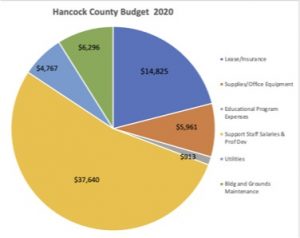
Total Expenses for FY 2020 – $70,502
Below explains the financial resources for programs offered, supported and managed out of the Hancock county office.
| Hancock County Support | $70.000 |
| Other Income: Donations to Hancock County Extension Association to help pay for office expenses/programming supplies | $ 1,274 |
| Carried over program funds from 2019, which allows us to pay for general office expenses for the 1st quarter of the upcoming year. | $25,376 |
Total Income for FY2020 – $96,650
Each year, Hancock county tax dollars support the UMaine extension with physical office space, support staff salaries, office supplies, equipment and some programming expenses. For every $1 in County funds, the UMaine Cooperative Extension invests $10 of Extension work in Hancock County.

